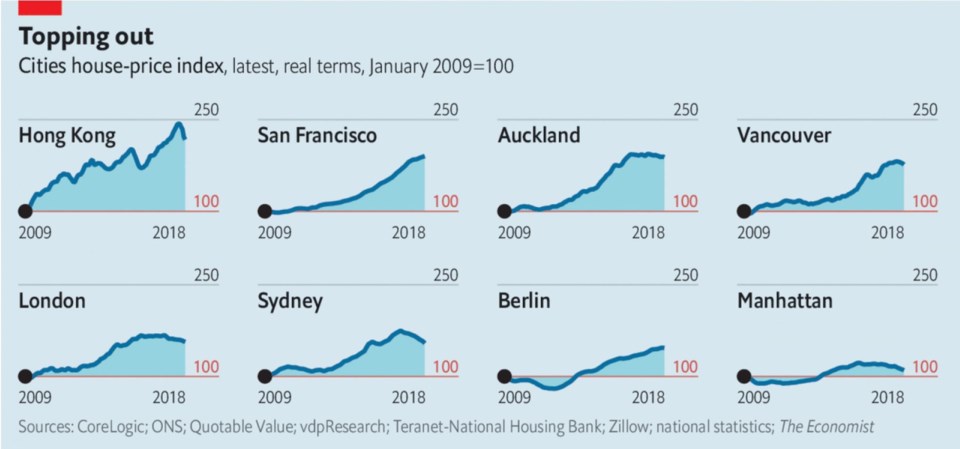ItŌĆÖs easy to think of Greater Victoria and Metro Vancouver real estate prices as being particularly hard-hit in the past couple of years, by a combination of provincial taxation measures and the federal stress test. But a by The Economist Group┬Āshows that, in global terms, B.C.'s major cities are far from alone in seeing recent declines in home prices.
Examining eight of the worldŌĆÖs prime urban real estate markets ŌĆō Auckland, Berlin, Hong Kong, London, Manhattan, San Francisco, Sydney and Vancouver ŌĆō the UK-based economics magazine and research group found that almost all of the cities have seen home prices drop in recent years.
The study charted price increases in the eight cities since 2009, using an index that measures comparative price growth with 2009 as the base.
Vancouver has seen a more recent decline, echoing activity in Hong Kong, where prices have grown considerably more than Vancouver since 2009.
The report said, ŌĆ£Prices started falling in August [2018] in Hong Kong and have dropped by nine per cent since. Developers there were spooked when their bids for a vacant parcel of land in the worldŌĆÖs most expensive neighbourhood ŌĆö aptly called ŌĆśThe PeakŌĆÖ ŌĆö failed to meet the governmentŌĆÖs reserve price in October.ŌĆØ

The Economist reported than prices in Manhattan fell by 4.3 per cent last year and that 60 per cent of home listed at $1 million or more in 2018 failed to sell. In Sydney, prime prices have slipped by 16 per cent since 2017.
In London, home prices have fallen by 20 per cent from their 2014 peak, according to international realty group Savills. The Economist said that Brexit ŌĆ£has not helped,ŌĆØ but that Lucian Cook, head of research at Savills, said there were also ŌĆ£broader reasons for the slowdown [in London prices]: falling cross-border capital flows; government policy; the cost of money; and increased supply.ŌĆØ
Of the eight cities examined, only Berlin and San Francisco have yet to see home prices decrease.
The report authors wrote that concurrent prices drops across prime cities are no coincidence, as global housing markets are now intrinsically interlinked.
ŌĆ£T│¾▒╠²International Monetary Fund (IMF) observes that house-price movements have become increasingly correlated across the world, and that the link is greater between big cities than between countries. That is because housing is becoming a more global asset class rather than a purely local one. The prevailing winds of the international marketplace affect prime residential property much as they do shares and bonds. The┬ĀIMF┬Ānotes that international correlation increases at the time of severe recessions and can help predict the risk of a downturn.ŌĆØ



